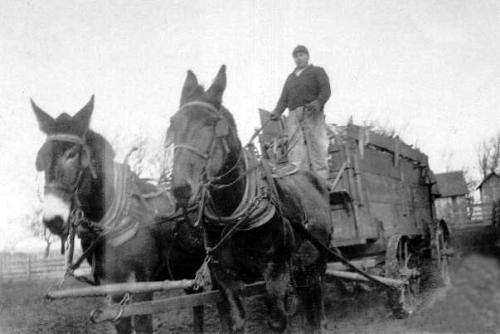May 14, 2013 report
Simulations show early farming might have caught on due to development of property rights

(Phys.org) —Samuel Bowles of the Santa Fe Institute and Jung-Kyoo Choib of Kyungpook National University have published a paper in Proceedings of the National Academy of Sciences theorizing that farming developed along with property rights. They suggest that the development of property rights caused early humans to farm during a time when it was less productive than hunting and gathering.
Scientists have grappled with the issue of why early humans began to farm during a time when doing so was less productive then hunting and gathering. Studies have shown that the earliest farmers were smaller and shorter than those that continued to find their food in its natural state—most likely due to eating less food. Why would anyone grow food, when it was so much easier to simply harvest food that was growing naturally? Bowles and Choib suggest it was because people began to value property rights.
The two researchers believe that some early hunter-gatherer groups came to value ownership of things such as their homes, tools, or boats. During good times, food could be had with relative ease, but in some cases, something caused that to change—food became harder to find, or kill. Instead of moving to a new place, however, some groups chose to stay. The researchers suggest this was partly due to not wanting to abandon what they owned, and partly because it was easier to raise kids when living in one place. Of course the only way to stay-put under such a scenario would be to cause crops to grow unnaturally.
To add credence to their theory, the researchers built mathematical models meant to recreate conditions during the time when farming was first starting to appear. Their models allowed for the simulation of events as they might have unfolded under various scenarios. The simulations that resulted showed farming developing only in communities that had established property rights. What's more, the simulations also showed that once farming and property rights comingled, farming took off.
In their paper, Bowles and Choib note that their ideas are still little more than informed theory, but maintain that their ideas follow common sense. They point out that farming didn't begin in other places ripe for it, such as California or parts of Australia, until Europeans moved in. They suspect it was because property rights hadn't evolved in groups that lived there.
More information: Coevolution of farming and private property during the early Holocene, PNAS, Published online before print May 13, 2013, doi: 10.1073/pnas.1212149110
Abstract
The advent of farming around 12 millennia ago was a cultural as well as technological revolution, requiring a new system of property rights. Among mobile hunter–gatherers during the late Pleistocene, food was almost certainly widely shared as it was acquired. If a harvested crop or the meat of a domesticated animal were to have been distributed to other group members, a late Pleistocene would-be farmer would have had little incentive to engage in the required investments in clearing, cultivation, animal tending, and storage. However, the new property rights that farming required—secure individual claims to the products of one's labor—were infeasible because most of the mobile and dispersed resources of a forager economy could not cost-effectively be delimited and defended. The resulting chicken-and-egg puzzle might be resolved if farming had been much more productive than foraging, but initially it was not. Our model and simulations explain how, despite being an unlikely event, farming and a new system of farming-friendly property rights nonetheless jointly emerged when they did. This Holocene revolution was not sparked by a superior technology. It occurred because possession of the wealth of farmers—crops, dwellings, and animals—could be unambiguously demarcated and defended. This facilitated the spread of new property rights that were advantageous to the groups adopting them. Our results thus challenge unicausal models of historical dynamics driven by advances in technology, population pressure, or other exogenous changes. Our approach may be applied to other technological and institutional revolutions such as the 18th- and 19th-century industrial revolution and the information revolution today.
Journal information: Proceedings of the National Academy of Sciences
© 2013 Phys.org



















